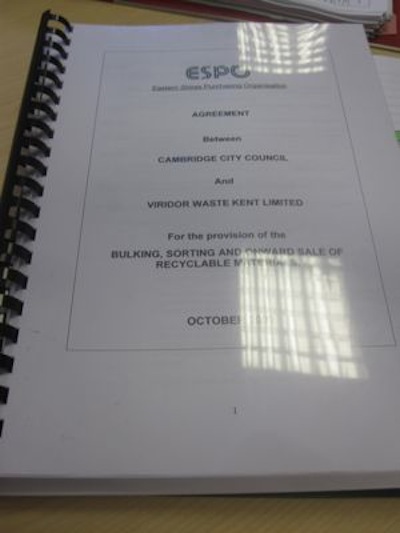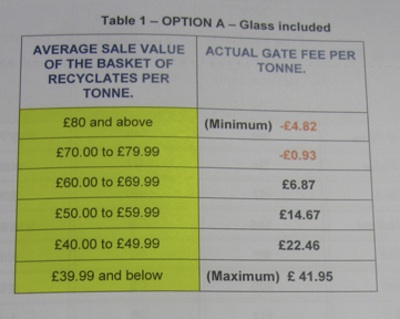
I have previously asked questions about Cambridge City Council’s contract to sort the city’s blue bin recycling. Writing to the Executive Councillor responsible, and asking public questions at the council’s Environment Scrutiny Committee failed to get details of the arrangement published or my questions answered. I asked to view the contract when I visited the council the in the “open period” during which any elector can inspect the documents behind the published accounts.
Having previously been denied access to a contract backing up the accounts I was rather surprised when I was provided with the document I had requested.
Blue Bin (Mixed Recycling) waste from Cambridge is taken off the city’s hands by a company called Viridor under a joint arrangement with Huntingdonshire District Council and Fenland District Council. The procurement process was run by the Eastern Shires Purchasing Organisation which I felt meant there was little, if any, open, transparent, local, democratic input into the specification of the requirements or the assessment of the tenders received.
Who Pays Who
A key part of the contract appears to be the “Gate Fee Adjustment Mechanism”; this suggests that as long as the average sale value of a defined “basket” of recycles is above £70/tonne then the contractor pays the councils for the recyclable materials they send to them. There is a sliding scale which protects the contractor in case the value of the materials plummets; so as usual all the risk is on the public sector and the vast majority of the profits from high resale values of waste go straight to the private company’s bottom line. If we end up with a situation where the materials in the blue bin are worthless the councils could be in for quite a bill for getting rid of it, but at the moment re-sale values are high and the Cambridge is selling its recyclable waste.

The City Council currently gets paid none of those rates though, but a “Starting Gate Fee” of £1.41/tonne. Quite why I don’t know; I may have missed something. I was provided with copies of raw invoices from Cambridge City Council to Viridor showing the following amounts:
- November 2009 310.68 Tonnes at £1.41 : £438.06 + VAT
- December 2009 616.60 Tonnes at £1.41 : £869.41 + VAT
- January 2010 761.62 Tonnes at £1.41 : £1,073.88 + VAT
- February 2010 552.32 Tonnes at £1.41 : £778.77 + VAT
Expanding What Can be Recycled
The contract is substantially formed from the answers Viridor gave to a tendering questionnaire. One question asked was: “Please state what additional materials you propose to have the capacity to handle during the term of the Contract?”
The response didn’t promise anything but said “Books (paper and hard back) and “Hard plastics (i.e. kerbside boxes or bins) “could be added … at any time”.
Fraction of Contamination Allowed
In October 2009 Cllr Ward, as Environment Scrutiny Committee chair, justified the Liberal Democrat secrecy surrounding the permitted level of food waste contamination by saying revealing the figure might encourage people to put such waste in the blue bins whereas what is wanted is recyclables to be as clean as possible.
At the time of asking the question I wanted to be able to assess the risks being taken by the city council; I was concerned that if the level had been set too low, and the council incurred charges for contaminated batches then the contractor could end up making a lot of money out of the city.
My question was answered by Appendix 3 of the contract which is titled the; “Input specification”. This states:
Where any Contract Material Load contains Contaminants or where the total level is greater than 10% in any Contract Material Load, the Contract Material Load may (following discussion with the relevant Authority) be rejected by the Contractor and not processed.
A Contract Material Load shall not be rejected where the level of Contaminants can be brought within the maximum allowable amounts by minimal and safe sorting using normal personal protective equipment (e.g. gloves, litter pickers, steel capped and soled boots etc.). Minimal sorting shall be undertaken by the Contractor at no additional cost to the Authority.
Despite the suggestion given by a literal reading of the first sentence of the above quote suggesting that simply containing “contaminants” could allow the contractor to reject a load the “Procedure for Contract Material Load rejection in the event of deemed Contamination” makes clear that contamination is defined as contaminants comprising more than 10% of the load.
If a load is determined to contain more than 10% contaminants (presumably by weight – it doesn’t say) then the authority has to pay a processing fee – which is the current price per tonne chargeable at the time of processing.
What Happens to the Material Recycled
One of the questions those tendering for the contract were required to answer was:
What will happen to the dry recyclables after sorting – i.e. where do you propose to dispose of or resell them, and as far as you can indicate, to what uses would the materials be put? Is it likely/possible that they would be exported, and if so are you confident that they would be properly disposed of / recycled?
The response is headed “Markets Portfolio” and includes a note, printed in red, stating :
Viridor respectfully requests that the Authorities treat the Commentary on markets portfolio as ‘Reserved Information’ and not for disclosure to third parties due to the commercial confidentiality of some of this information”
It has been suggested that one approach I could take is to offer to provide copies of this section of the document to any Cambridge City electors who ask me for one. I suppose the commercially valuable bit is the list of companies who might buy the materials, but they’re only a list of potential buyers, some of which are clearly processors and others are apparently end users. Other than not listing the companies though I won’t let the “commercial confidentiality” statement restrict my futher notes on the response which starts:
“Vididor markets all its recyclables through its specialist company, Viridor Resource Management Ltd. (VRML) which is the national marketing and sales arm of Viridor, for all recyclate materials and their onward logistics to our end market customers/users”.
Much of the response, in fact much of the material provided in response to the questions, is just marketing bumf apparently intended to puff up the image of the company. One key statement though is that: “During the current difficult trading period VRML has and continues to market all its processed stock”.
While all the end markets and applications proposed are in the UK, or in the case of “News and Pams” and “Mixed Papers” the UK and EU the response states: “VRML is one of only a few companies in the UK accredited by the Chinese Export/Import Authorities – AWSIQ and CCIC for export of all Paper, Plastics and metals grade recyclables to China”. … “VRML do not sell to agents by market and deliver the materials direct to the end customer/reprocessors door, no matter where in the world.”
A special Chinese quality assurance scheme involving photographs of waste consignments being taken is described. Having read what is described I am left not understanding what the photographs actually achieve. Viridor has told the councils that for material exported to Asian/Chinese markets:
Every load’s material is photographed twice as it is loaded. The last photograph has to include the unique serial number of the container, ie. with one door shut. These photographs, along with all shipping documentation, must me submitted to the UK based Chinese Environmental import inspection authority (CCIC) for approval prior to shipment. Random and regular site visits by CCIC are made to inspect material quality in stock and despatch. Certificates of import approval are issued before shipping can occur.
It appears to be a system for allowing the Chinese to, should they wish, reject a shipment based on what it looks like, before it has left the UK. I can’t see how it addresses the key question of if the material exported to China is actually productively recycled, and not landfilled.
See also
- Unbelievable Presentation on Blue Recycling Bins – South Area Committee September 2009
- 2009/10 Accounting records relating to Blue Bin waste recycling – released to me during inspection of accounts during open period. Includes details of spending on the binds themselves, their delivery and publicity.
- Secrecy Surrounding Contract to Sort Cambridge’s Recycling in Peterborough – October 2009
- Introducing Co-mingled Recycling to Cambridge -January 2009
3 responses to “Cambridge City Council Blue Bin Recycling Contract”
I am very interested in this contract. Please explain to me where I can see it.
Regards
Simon Elsworth
The Cambridge News has published an article: “Your recycled plastic could be off to China”:
http://www.cambridge-news.co.uk/Home/Your-recycled-plastic-could-be-off-to-China.htm
I visited the council during the open period for the accounts under the audit commission act and viewed the invoice from the council to Viridor for August 2010
This was for 645.2 tonnes of material at £4.82 per tonne = £3,111.41 + VAT
It is interesting to compare this to the raw invoices I obtained the previous year which are detailed in the article.
The August 2010 invoice uses the £4.82 figure which is in the table in the contract. I still don’t know where the £1.41 came from.